Rich results offer a myriad of advantages to web pages beyond just standing out in search. They not only elevate your online visibility but also contribute to enhanced organic traffic and build trust among users. When leveraged strategically, rich results align closely with your overarching business objectives, offering measurable benefits.
Before diving into the rich results that exist and how they can support your business, let’s explore what rich results are exactly.
What is a Rich Result?
A rich result (formerly known as a rich snippet) is an enhanced search result displayed on Google’s search engine results page (SERP) that can be achieved by implementing the appropriate structured data (aka Schema Markup) on your site. Structured data helps search engines better understand the content on your page and display that content with a more detailed appearance on the SERP.
Unlike standard organic search results, rich results offer users additional information beyond the typical page title, URL, and meta description, enhancing their search experience.

Rich results go beyond conventional search results by offering a more informative and decorated appearance, which significantly enhances a page’s visibility in search.
When implemented correctly, rich results provide users with additional information such as ratings, pricing, reviews, job locations, and more, allowing pages to stand out beyond the usual blue links and short previews.
By enriching the user experience, these decorated results not only make the search process more informative but also yield measurable advantages for businesses.
Benefits of Rich Results for Businesses
Stand Out in Search & Gain a Competitive Advantage
For businesses, rich results offer a competitive advantage by presenting content in a more compelling and authoritative manner. Businesses can showcase key information directly in the SERP, informing users that their content is best aligned with their queries, and persuading more qualified traffic to click through for further information.
Reduce Spend on Sponsored Content
With a stronger organic presence through rich results, businesses can save on advertising costs and sponsored content while still effectively reaching their target audience, increasing CTR, and driving valuable traffic to their websites.
Drive Qualified Traffic
A rich result can also drive more qualified traffic to your site. When searchers see elements like pricing on a product they are interested in, or a relevant job description on a job posting, they can self-assess and determine if your content will provide them with an answer to their query.
This self-qualification process can lead to a higher likelihood of getting clicks from users genuinely interested in your listings, leading to a higher chance of converting them to your page.
Delight Your Customers With Answers
Rich results streamline the process of providing customers with relevant information directly on the SERP, ensuring a seamless user experience.
For instance, when users search for specific recipes, rich results promptly showcase essential details like ingredients, cooking duration, and ratings, eliminating the need to visit individual websites for such information.
Similarly, for local businesses, rich results efficiently present vital information such as operating hours, contact details, and customer feedback directly in the search results, facilitating quick access to necessary details.
This approach not only enhances user satisfaction by delivering instant answers but also saves customers time, thereby increasing the likelihood of further engagement with the business.
Build Trust With Your Audience
Some rich results like review snippets can help your brand establish trust, authority, and credibility with new customers at the start of their buyer journey. They enable you to showcase positive reviews and high ratings for your brand, which reflect the trust that other users have placed in your product or service.
By doing so, you can build strong E-E-A-T, which represents the Experience, Expertise, Authoritativeness and Trustworthiness of your brand and can have a strong influence on conversions.
Drive Measurable Results for Your Business
At Schema App, we’ve seen the impact a rich result can have on the click-through rate of a web page. Our customer, Baptist Health saw a 491% increase in the CTR when comparing physician pages with a review snippet to those without.
Implementing Schema Markup to achieve rich results is a strategy that can provide your company with measurable ROI.
Develop Your Content Strategy
Just like how you need to have the necessary content on your page to markup with structured data, you can customize your content to meet the required properties for a specific rich result.
Your Schema Markup strategy is unique to the goals of each page, and which rich results would serve your page’s user queries and intent the best. It’s essential to adhere to content guidelines specific to each structured data type to ensure your content contains the relevant Types and properties for your rich result goal.
Are you looking for more product sales? Be sure to include product images, pricing, and ratings to be eligible for Product rich results.
Looking to get more appointments booked? Include reviews and ratings on your physician pages to build trust and establish credibility with potential patients to encourage them to book.
All in all, being aware of the desired outcomes and rich result goals you have for each page can help drive your content strategy in an actionable way.
See how Sharp HealthCare utilized the schema.org vocabulary to architect their content strategy.
By leveraging rich results effectively, businesses can gain a competitive advantage and enhance their online visibility organically, ultimately offering users a more engaging and informative search experience.
Let’s take a closer look at some of the rich results available on Google.
Rich Result Examples & How They Support Business Objectives
Review Snippets
Review snippets appear in the SERP when a user searches for a product, local business, movie, and other content types. It displays a concise summary of review ratings and other information, such as the average rating and the number of reviews, directly on the SERP.
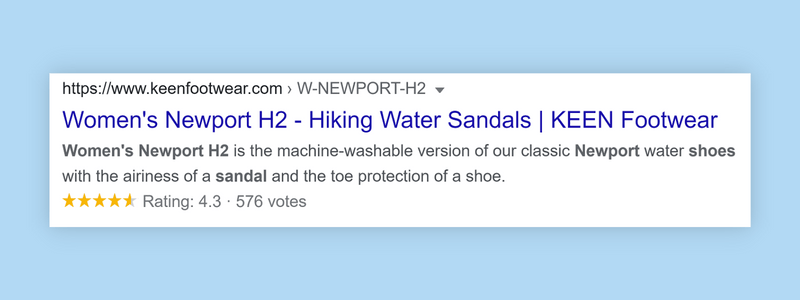
Review snippets help users make informed decisions before clicking through to a specific website. For businesses, review snippets can significantly impact their online reputation and trustworthiness, as positive reviews can instill confidence and entice potential customers, boosting click-through rates to their website.
Product Rich Result
When a user searches for a specific product, the Product rich result provides detailed information about the product, including its name, price, availability and reviews, directly on the SERP.
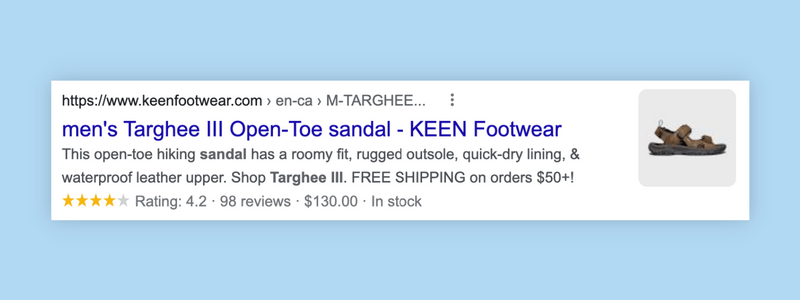
This rich result offers users a quick glance at essential product details, allowing them to compare options and make purchasing decisions without needing to visit a specific website.
For instance, if you have a product page, achieving a Product rich result will provide you with an enhanced result that can display product images, pricing, ratings, availability, and even shipping and return details directly on the SERP.
These details allow potential customers to make quicker purchasing decisions before even visiting your website. This immediate access to essential product information can have a significant influence on buying decisions.
Google recently started awarding rich results even without structured data. Our experience, however, is that they don’t always get it quite right. We’ve seen Google providing Product rich results on non-product pages or even highlighting incorrect prices.
By implementing structured data, you can build trust with your users by taking control of what should be highlighted on your product pages and be reassured the correct details are shared with your users.
Job Posting Rich Result
JobPosting rich results appear when a user searches for job opportunities. It displays relevant job listings directly on the SERP, providing essential details such as job titles, locations, and company names.

This rich result allows job seekers to view and compare job openings without needing to visit individual job boards or company websites. For employers, job-posting rich results can significantly improve their recruitment efforts by increasing the visibility of their job listings and attracting potential candidates.
We have seen our client Baptist Health increase their CTR by 1194% when JobPosting rich results were achieved. You can read the case study here.
These are just a few of the many rich results available on Google. There are, however, other search features on Google that are not considered a rich result. Let’s dig in.
What is NOT a Rich Result?
On top of rich results, there are other visually appealing Google SERP features you can optimize for without using structured data. While rich results are powered by structured data, there are other formats that can achieve a similar outcome, and it’s important to know the difference.
Knowledge Panel
For instance, a knowledge panel is an information box that appears on the right side of the search engine results page, offering concise details about a specific entity or topic. Though not technically a rich result, it displays relevant data, including images, links, and key facts, making it highly useful to users.

Featured Snippet
Similarly, a featured snippet showcases a summarized answer to a user’s query at the top of the search results, often extracted from a webpage. These features enhance the user experience by providing quick, relevant information in an easily accessible manner, even without structured data markup.
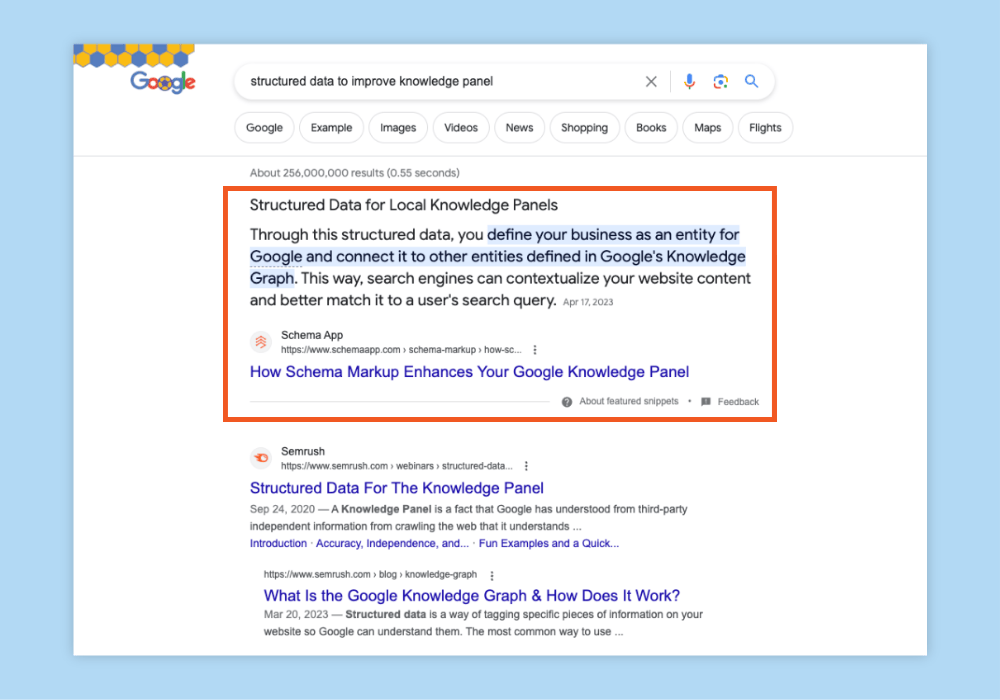
Other Google search results that resemble rich results, but are in fact not rich results, include:
People Also Ask
The “People Also Ask” feature presents a list of related questions that users frequently ask based on their original query. When users click on these questions, additional drop-down answers appear, offering more detailed information.
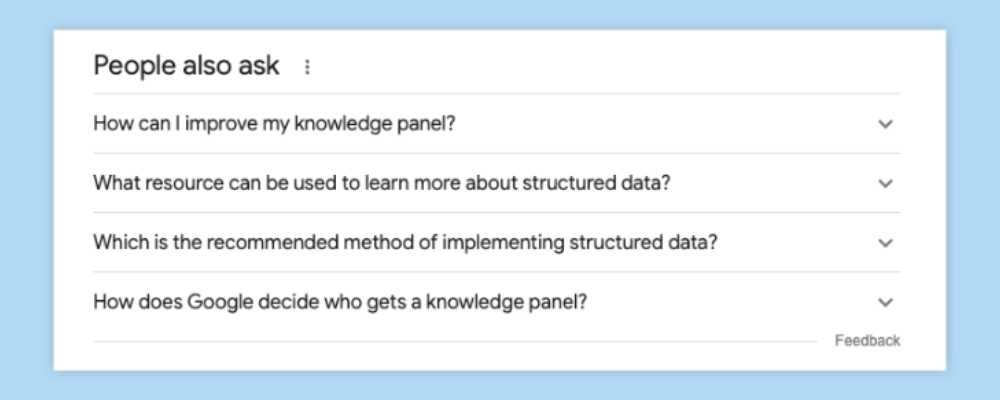
Though not directly utilizing structured data, this dynamic presentation of information can resemble rich results due to its interactive nature and visually appealing design.
Sponsored Content
Sponsored content, which includes paid advertisements and promoted links, can also resemble rich results in appearance. These sponsored listings are often displayed with attractive images, catchy titles, and additional metadata to capture users’ attention.
Even though they are not organically generated through structured data, sponsored content can have a visually rich and distinct format, leading to potential confusion with true rich results by users.
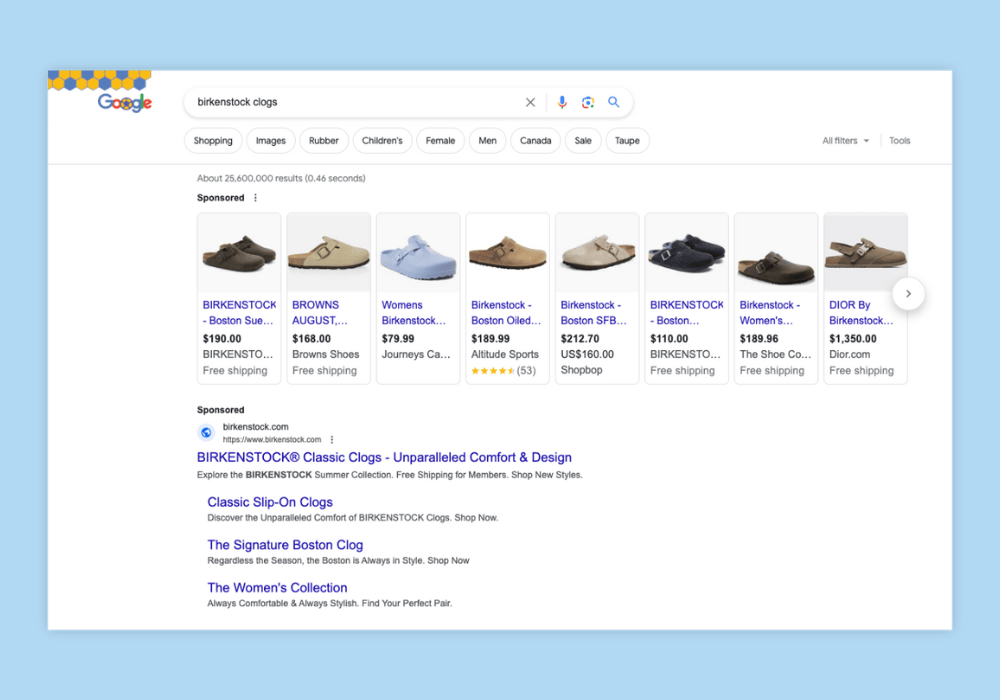
HTML Tables
In the SERP, an HTML table is a structured layout used by search engines to display certain types of information from web pages. It organizes data in rows and columns, making it easier for users to interpret and compare different data points

If a webpage contains a table with data that is relevant to a specific query, search engines may choose to display that table in the search results to provide users with a quick overview of the information they are looking for.
Though the HTML table itself is not a rich result from structured data, it can be utilized in conjunction with rich results like Product to further enhance the user experience.
Rich Results Vs. Other Enhanced Results
While alternative results in the SERP can still be visually engaging and informative, structured data remains the preferred way to achieve enhanced results by achieving a more query-focused presentation of data in the form of rich results.
By leveraging structured data, you ensure that the information displayed aligns precisely with user search intent. Interactive elements present in many rich results further engage users.
The Schema Markup used to generate these results enables better comprehension for search engines, leading to improved rankings, better search performance, enhanced user experience, and even greater preparedness for the future of AI-Generative Search.
Overall, rich results powered by structured data provide a competitive advantage, offering a context-rich experience and greater authority in SERPs, making them a preferred choice for businesses and SEOs aiming to optimize their online presence.
How to Achieve a Rich Result on Google
As mentioned earlier, you can achieve a rich result by implementing the required structured data on your web page. However, there are a few other factors that can affect your eligibility for a rich result. Here are the steps you can take to be eligible for a rich result.
Step 1. Identify which rich result your page could be eligible for
Google currently boasts over 32 different types of rich results, each catering to distinct content intents and page structures. Deciding which rich result is most beneficial for your page hinges on understanding the intent behind your content and optimizing its structure accordingly.
Before deciding what rich result to target, you need to understand:
- Who the target audience is for your page
- What query would best match your content
- What your intent is with your page
- What rich result would convey the information on your web page most effectively
Rich results offer distinct benefits based on the type of content you have on your website, which means that your rich result goals should be page specific.
For example, if you have a product listing page, a product rich result would be most appropriate because it already has information about pricing, shipping, ratings etc.
On the other hand, if you offer a service that receives reviews and ratings, you might consider targeting a review snippet for your page because it promotes credibility and trust to people seeking that service.
Step 2. Ensure the content on your page fulfills the required Schema.org properties
Based on Google’s Structured Data Guidelines, you need to markup your page with the required properties for the specific Schema.org Type that you are using to achieve your targeted rich result.
For example, if you want to target a review snippet for your physician page, you need to add Review structured data markup and include the required properties listed in the guidelines.
You can also include the recommended properties to add more information to your structured data to decorate your rich result with even more information. A good example of this would be the product rich result.
At its basic level, a Product rich result requires at least one of the following three properties in your content: review, aggregate rating, and offer (price). However, by including all three properties or additional ones like price ranges, shipping availability, starting prices, and discounts, you can make the product rich result more informative and compelling.
This way, a more dynamic and detailed result will appear on the Search Engine Results Page (SERP).
That said, you should only mark up content that exists on your page and is visible to the readers of the page. If you mark up content that is not present on your page, it will result in schema drift and you will not be awarded the rich result.
Here are some additional tips on how you can optimize your content to achieve a rich result.
Step 3. Author the structured data markup for your page
Once you’ve ensured that your page has the content needed to fulfill the required properties, you can go ahead and author your structured data markup.
To be eligible for a rich result, Google requires you to markup your web page using one of the three supported formats: JSON-LD, microdata, or RDFa. However, Google prefers JSON-LD as its markup format.
You can manually write the JSON-LD code or you can use tools like the Schema App Editor to generate the JSON-LD code for you. Before adding the JSON-LD code to your web page, you should also check to ensure your markup follows Google’s structured data guidelines and content guidelines.
Step 4. Add the JSON-LD structured data markup to your web page
There are a few ways to add the JSON-LD code to your web page. You can manually paste the JSON-LD structured data to the HTML of your web page. However, if you make any changes to the content on your site, you will need to manually update the structured data to prevent schema drift.
Alternatively, you can use the Schema App Editor to generate and deploy the JSON-LD code to your web page. This method is less complicated and allows you to easily manage and update your structured data without having to do any coding.
Once you’ve added the structured data to your page, you can use Google’s Rich Results Testing Tool or the Schema.org Validator to test that your structured data is working properly.
It is important to know that adding structured data to your web page does not guarantee that it will appear as a rich result, despite rich results being powered by structured data. Google tailors the search results to provide users with the best search experience. If they do not deem a specific rich result to be appropriate for the query, they will not award you the rich result.
Make Your Content Eligible for Rich Results
Rich results are a valuable asset for businesses aiming to enhance their online visibility, organic traffic, and user experience. Utilizing Schema Markup is key to achieving these results, as it allows search engines to understand and present content in a more contextual, visually appealing and informative way.
While adding structured data to your pages doesn’t guarantee a rich result with Google, you can increase your chances by ensuring high-quality content, expertly implemented markup and alignment with Google’s structured data and content guidelines.
To see how Schema App can help your organization leverage quality content to execute an effective Schema Markup strategy and drive measurable results, contact Schema App today.

